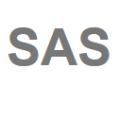Scientific datasets present unique challenges for machine learning-driven compression methods, including more stringent requirements on accuracy and mitigation of potential invalidating artifacts. Drawing on results from compressed sensing and rate-distortion theory, we introduce effective data compression methods by developing autoencoders using high dimensional latent spaces that are $L^1$-regularized to obtain sparse low dimensional representations. We show how these information-rich latent spaces can be used to mitigate blurring and other artifacts to obtain highly effective data compression methods for scientific data. We demonstrate our methods for short angle scattering (SAS) datasets showing they can achieve compression ratios around two orders of magnitude and in some cases better. Our compression methods show promise for use in addressing current bottlenecks in transmission, storage, and analysis in high-performance distributed computing environments. This is central to processing the large volume of SAS data being generated at shared experimental facilities around the world to support scientific investigations. Our approaches provide general ways for obtaining specialized compression methods for targeted scientific datasets.
翻译:暂无翻译





